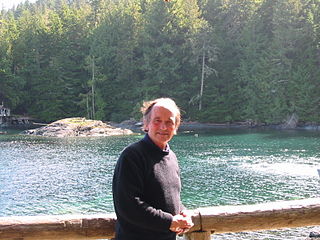 W
WHelen Irene Battle was a pioneering Canadian ichthyologist and marine biologist. She was the first Canadian woman to earn a PhD in marine biology and she was also one of the first zoologists to engage in laboratory research. She was an emeritus professor of zoology at the University of Western Ontario from 1972.
 W
WDr. Michael Andrew Bigg was a Canadian marine biologist who is recognized as the founder of modern research on killer whales. With his colleagues, he developed new techniques for studying killer whales and conducted the first population census of the animals. Bigg's work in wildlife photo-identification enabled the longitudinal study of individual killer whales, their travel patterns, and their social relationships in the wild, and revolutionized the study of cetaceans.
 W
WMoira Brown is a Canadian North Atlantic right whale researcher. She is leading the initiative to convince the Government of Canada, shipping industry and scientists to address ship strikes and North Atlantic right whale mortality in the Bay of Fundy, Canada. Brown has conducted research on whales for more than 30 years.
 W
WWilliam Cheung is a marine biologist, well known for his research on the impacts of climate change on marine ecosystems and fisheries. He currently works as director of science of the Nereus Program and is also an associate professor at the University of British Columbia, as well as Leader at the UBC Changing Ocean Research Unit.
 W
WSteven J. Cooke is a Canadian biologist specializing in ecology and conservation physiology of fish. He is best known for his integrative work on fish physiology, behaviour, ecology, and human-dimensions to understand and solve complex environmental problems. He currently is a Canada Research Professor in Environmental Science and Biology at Carleton University and the Editor-in-Chief of the scientific journal Conservation Physiology.
 W
WLlewellya Williams Hillis, later Llewellya Hillis-Colinvaux, was a Canadian-born American marine biologist.
 W
WErich Hoyt is a whale and dolphin (cetacean) researcher, conservationist, lecturer and author of 22 books and more than 600 reports, articles and papers. His book Marine Protected Areas for Whales, Dolphins and Porpoises, has been widely reviewed as the "definitive reference of the current extent of cetacean ecosystems-based management" and as "a unique and essential book for anybody interested in the conservation and protection of cetaceans. [This] definitive source on MPAs marine protected areas for cetaceans…will influence the design and management of this important and rapidly developing conservation tool." Choice listed the book as an "Outstanding Academic Title’ for the year 2012. Since 2013, as Research Fellow with Whale and Dolphin Conservation (WDC) and IUCN SSC/WCPA Marine Mammal Protected Areas Task Force co-chair with Giuseppe Notarbartolo di Sciara, Hoyt has focussed on the creation and development of the new conservation tool of Important Marine Mammal Areas, or IMMAs. In 2016, following a MAVA Foundation pilot project to identify IMMAs in the Mediterranean, the Task Force's GOBI collaboration funded by the German Climate Initiative (IKI) began a six-year project to identify and implement IMMAs across most of the southern hemisphere. The IMMA tool has been received and widely endorsed by the Convention on Migratory Species (CMS), the Convention on Biological Diversity (CBD), various commissions within the International Union for Conservation of Nature (IUCN), the International Whaling Commission, as well as national governments and scientists.
 W
WAlexandra Bryant Hubbard Morton is best known for her 30-year study of wild killer whales in the Broughton Archipelago in British Columbia. Since the 1990s, her work has shifted toward the study of the impact of salmon farming on Canadian wild salmon.
 W
WRansom Aldrich "Ram" Myers, Jr. was a world-renowned American-Canadian marine biologist and conservationist.
 W
WDr. Paul Spong is a neuroscientist and cetologist from New Zealand. He has spent more than 30 years researching orcas in British Columbia, and is credited with increasing public awareness of whaling, through his involvement with Greenpeace.
 W
WAmanda Vincent is a Canadian marine biologist and conservationist, one of the world's leading experts on seahorses and their relatives. She currently holds the Chair of the IUCN SSC Seahorse, Pipefish and Seadragon Specialist Group and is the marine representative on the IUCN’s International Red List Committee as well as being the Chair of its Marine Conservation Committee. She previously held the Canada Research Chair in Marine Conservation at the UBC Institute for the Oceans and Fisheries at The University of British Columbia (UBC), Canada from 2002 to 2012. Vincent co-founded and directs Project Seahorse, an interdisciplinary and international organisation committed to conservation and sustainable use of the world's coastal marine ecosystems. In 2020 she became the first marine conservationist to win the world's leading prize for animal conservation, the Indianapolis Prize.